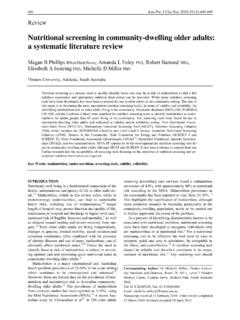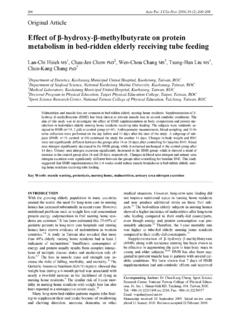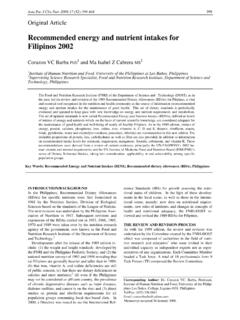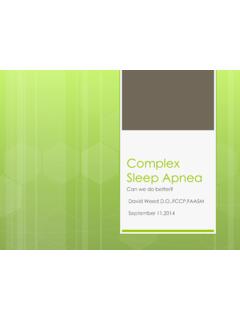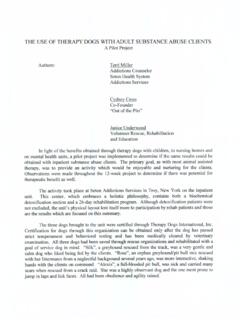Transcription of Effect of kiwifruit consumption on sleep quality in adults ...
1 Asia Pac J Clin Nutr 2011;20 (2):169-174 169 Original Article Effect of kiwifruit consumption on sleep quality in adults with sleep problems Hsiao-Han Lin MS1, Pei-Shan Tsai PhD2, Su-Chen Fang MS2, Jen-Fang Liu PhD1 1 School of Nutrition and Health Sciences, Taipei Medical University, Taipei, Taiwan 2 College of Nursing, Taipei Medical University, Taipei, Taiwan Numerous studies have revealed that kiwifruit contains many medicinally useful compounds, among which anti-oxidants and serotonin may be beneficial in the treatment of the sleep disorders. The aim of this study was to evaluate the effects of kiwifruit on sleep patterns, including sleep onset, duration, and quality . In this study, we applied a free-living, self-controlled diet design.
2 Twenty-four subjects (2 males, 22 females) 20 to 55 years of age consumed 2 kiwifruits 1 hour before bedtime nightly for 4 weeks. The Chinese version of the Pittsburgh sleep quality Index (CPSQI), a 3-day sleep diary, and the Actigraph sleep /activity logger watch were used to as-sess the subjective and objective parameters of sleep quality , including time to bed, time of sleep onset, waking time after sleep onset, time of getting up, total sleep time, and self-reported sleep quality and sleep onset latency, waking time after sleep onset, total sleep time, and sleep efficiency before and after the intervention. After 4 weeks of kiwifruit consumption , the subjective CPSQI score, waking time after sleep onset, and sleep onset la-tency were significantly decreased ( , , and , respectively).
3 Total sleep time and sleep effi-ciency were significantly increased ( and , respectively). kiwifruit consumption may improve sleep onset, duration, and efficiency in adults with self-reported sleep disturbances. Further investigation of the sleep -promoting properties of kiwifruit may be warranted. Key Words: insomnia, sleep disorders, kiwifruit , antioxidants, sleep quality INTRODUCTION Difficulty falling asleep or staying asleep, or disturbed sleep associated with impaired daytime functioning, af-fects as many as one-third of Chronic insomnia may also lead to an increased risk of depression and chronic use of hypnotic Insomnia is usually treated with stimulus control therapy, relaxation training, and cognitive behavioral therapy, judicious use of hyp-notic agents, or with non-pharmacologic Cog-nitive behavioral therapy is, however, often difficult and time-consuming to learn, and response to treatment varies And.
4 Almost all benzodiazepines and nonbenzo-diazepines that are effective for short-term management of sleep disorders produce adverse effects such as day-time sedation, cognitive impairment, dependence and rebound Other non-pharmacologic remedies, including antihistamines with sedative effects and alcohol, are ineffective for long-term treatment. Within a few days after antihistamine use, patients may develop tolerance to sedation and adverse effects usually follow within a few With alcohol, there is a risk of dependence and exacerbation of other conditions such as gastroesophageal reflux, sleep apnoea, and increased urinary Consequently, natural treatments that can improve both sleep onset and help patients improve the quality of sleep while improving next-day symptoms over the long term are highly desirable.
5 Some non-prescription and herbal products such as kava kava and St. John s wort are advertised as sleep -enhancing agents but have not been rigorously studied and there is little evidence that they are effective. Herbal products like Jamaican dogwood and kava kava may also pose poten-tial Kiwifruits (Actinidiaceae) are native to eastern Asia and their use for treatment of cancer-like diseases, particularly of the digestive tract, dates as far back as 700 Nu-merous studies have revealed that kiwifruit contains many medicinally useful compounds such as vitamins, carote-noids, and It is well known that patients with sleep disorders and various neuropsychiatric states exhibit increased levels of oxidative kiwifruit is rich in antioxidants, vitamins C and E, flavonoids, anthocyanins, and carotenoids, and it contains approximately twice the concentration of serotonin as Serotonin is an end product of L-tryptophan metabolism.
6 Which is related to rapid eye movement (REM) sleep and its low levels may cause ,13 Additionally, kiwifruit is rich in folate and insomnia is one of the neuropsychiatric diseases that are secondary to folate ,15 Therefore, it is possible that consuming kiwifruit may be beneficial in Corresponding Author: Dr Jen-Fang Liu, School of Nutrition and Health Sciences, Taipei Medical University, 250 Wu-Hsing Street, Taipei 110, Taiwan. Tel: +886- 2-27361661 ext 6546; Fax: +886- 2-27373112 Email: Manuscript received 30 September 2010. Initial review com-pleted 3 December 2010. Revision accepted 1 February 2011. 170 HH Lin, PS Tsai, SC Fang and JF Liu improving sleep quality in those who have sleep disorders.
7 This study was designed to evaluate the effects of ki-wifruit consumption on various subjective and objective measures of sleep qualities, as measured by actigraphy and a sleep diary, in free-living individuals complaining of sleep disorders. MATERIALS AND METHODS This study was conducted at Taipei Medical University between July 2005 and February 2006, and used a free-living, self-controlled diet design. All participants were asked to sign an informed consent form. The protocol was approved by the Human Research Committee of Taipei Medical University. Forty-four volunteers (aged 20 years) who had self-reported sleep disturbances and who had expressed an interest in participating in a dietary intervention study were recruited from the general public and university student body; 44% of participants were college students.
8 Inclusion criteria were self-reported sleep disturbances. A previously validated Chinese version of the Pittsburgh sleep quality Index (CPSQI) was used to screen volun-teers, and a global CPSQI score of 5 was used as the cut-off value indicating poor Participants were also excluded from the study if they were taking one of the following types of medications at the time of the study: anticonvulsants, antidepressants, beta-blockers, steroids, bronchodilators, stimulants, or decongestants. Twenty-four subjects, 2 males and 22 females, between 20 and 55 years of age, were enrolled in the study and their data analyzed statistically. All subjects were asked to maintain their normal dietary patterns and activities, but to stop using any hypnotic drugs during the study period.
9 Each subject's height, weight, and body mass in-dex (BMI) were recorded at the initial interview. Medical history was not included. Instruments used in this study consisted of a self-reported health questionnaire, the CPSQI, and a sleep diary, which were used to assess the subjective parame-ters of sleep quality , , time to bed, time of sleep onset, waking time after sleep onset, time of getting up, total sleep time, and sleep quality . The self-reported sleep quality was classified as excellent, very good, good, bad, and very bad. Subjects were asked to complete the sleep diary within 30 minutes after awakening. In addition, a Mini-Motionlogger Actigraph sleep /activity logger wrist watch (Ambulatory Monitoring Inc.)
10 , Ardsley, NY, USA) was used to objectively assess parameters such as sleep onset latency (SOL, min), waking time after sleep onset (WASO, min) total sleep time (TST, min), and sleep effi-ciency. sleep efficiency was defined as the percentage of actual sleep time between sleep onset and final awaken-ing. All subjects participated in the 5-week, 3-phase study, which included a baseline phase (3 days), a dietary inter-vention phase (4 weeks), and a washout phase (3 days) (Figure 1). For the baseline and washout phases, subjects were asked to fill out the Chinese version of the Pitts-burgh sleep quality Index (CPSQI), and to keep a 3-day sleep diary and to wear a sleep /activity logger wrist watch (ActiGraph, Actigraph Company, Pensacola, FL, USA) that assessed and monitored the quality of their sleep and activity.
